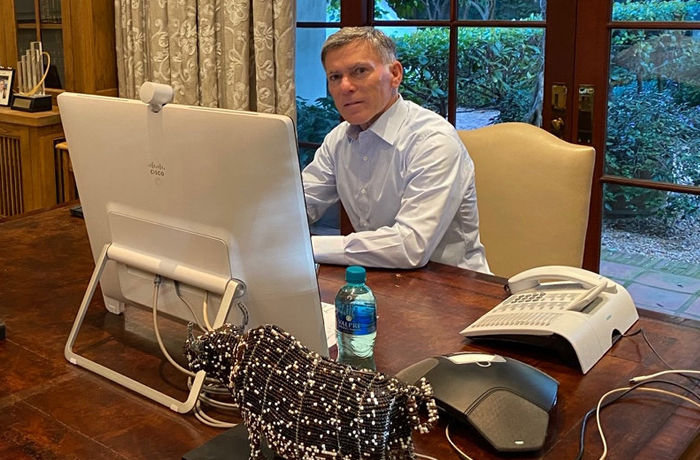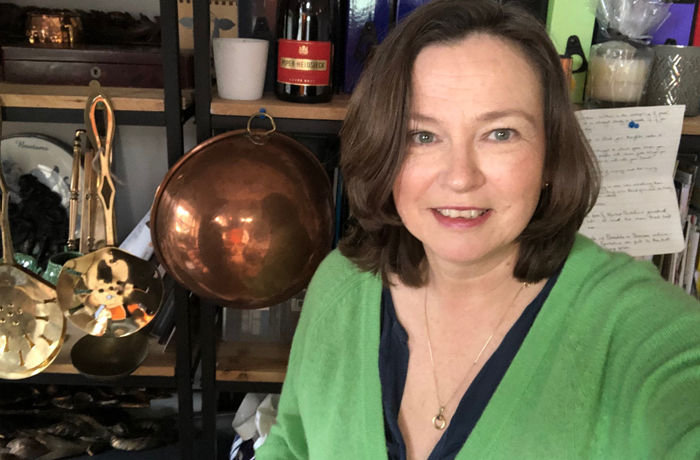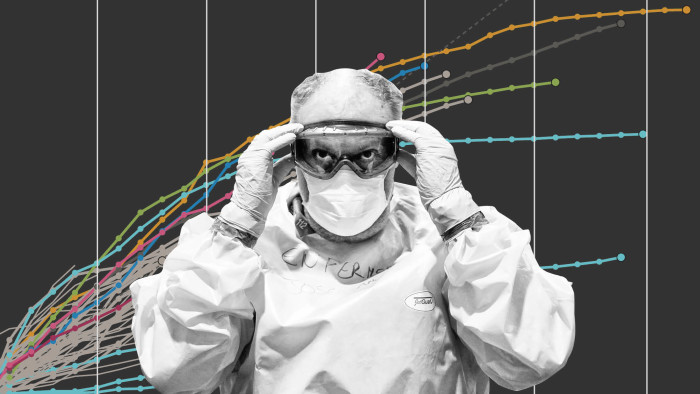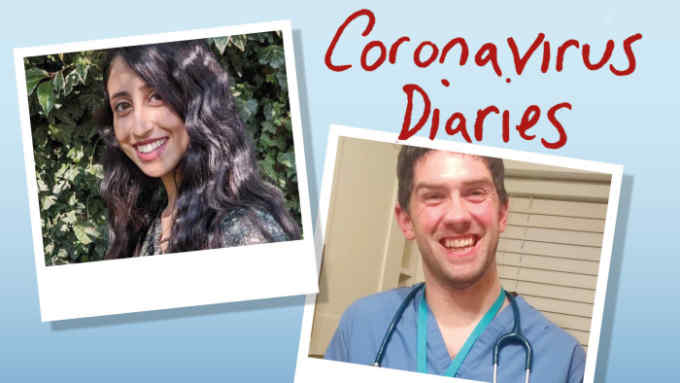Coronavirus Diaries: a business leader and a pubs owner on their lockdown lives

Roula Khalaf, Editor of the FT, selects her favourite stories in this weekly newsletter.
Adrian Gore, founder and CEO of South Africa’s Discovery group, creator of Vitality insurance
‘I’m on the screen literally 15 hours a day, from six in the morning till nine at night. It’s relentless’
This pandemic was on our radar from the get-go and not just because we are shareholders in a health insurer in China, where the outbreak began.
About a week before the South African government lockdown started, one of my children developed Covid-19 symptoms and had to be tested. The result turned out to be negative and he’s fine, but I had to go into isolation. So I have been working in my home office for weeks now and it is pretty intense.
We have about 12,000 employees around the world and more than 70 per cent are now working remotely. Some are still going into places like our call centres, but the rest of us are at home doing our work on the phone or with Zoom and Microsoft Teams.
I’m on the screen the whole day, literally 15 hours a day, from six in the morning through till nine at night. It’s relentless.
That is partly because of the extraordinary pace of change. We are doing work in weeks that used to take six months. We own Vitality insurance and investment and have reconfigured the entire product suite to focus on rewards you can use at home, like online workouts with Jessica Ennis-Hill, the Olympic champion, and discounts on healthy Waitrose food.
The other reason it is so relentless is there are no physical barriers between home and work. You are not driving to the office or getting on the train, you are basically on the whole time and the expectation to respond instantly is huge.
I’ve tried to tell our people they have the right to say: “Listen, I need a break, this is lunch time, I’m not available.”
We’ve done a lot of research on the best way to work remotely and one thing we have introduced to help everyone feel connected that I think has worked very well is a daily 2pm staff webinar, where someone gives a talk and takes questions live.
I gave the first talk and one of our key people gave the second. We’ve also organised guest appearances from people like Scott Kelly, the American astronaut who used to command the International Space Station. He’s an expert on isolation. Thousands of people come into the webinar and listen each day.
People are under a lot of stress. They often don’t have help at home and they get very embarrassed if a child jumps on to the desk when they’re on a video call. I am saying: “Don’t worry if you see kids on the video.” It is what it is. People have to get through this thing. You don’t need formality now.
Three of my children are here at home in Johannesburg but I have a daughter studying in Boston and although she’s in a great city with world-class health facilities, I’m worried that we could be separated for a long time. That’s the truth of it.
I’m also worried about my wife’s mother and my parents. They are only 5km away from us but we can’t get to them because of the lockdown.
These are frail old people who are very vulnerable to the virus, so it is troubling to be at a distance, on the phone, trying to make sure that they are protected from infection whenever they get food and help.
The data for people like them looks pretty bleak. If they do get sick I think the mortality chances are very high so that is a very, very significant worry.
The research also shows that at a time like this it is important to stick to a routine and set goals. One goal I have set myself is learning how to do things around the house that I haven’t done in years, like mowing the lawn.
It’s amazing how incompetent I am. I didn’t realise how hard it is to make sure the electrical cable doesn’t get tangled. I’m going to have a go later today again. There’s been a lot of rain so I’ve got to try and keep the house reasonably intact.
As told to Pilita Clark
Jo Eames, co-founder of Peach Pubs
‘I never imagined asking our managers to film themselves tipping casks of ale — a pub’s life blood — down the drain. I couldn’t watch’

Back in March, the government announced that pubs would get a refund on the duty paid on beer they were having to destroy — but they wanted video evidence.
Eighteen years in hospitality mean I’ve seen some gruesome sights. But I never imagined asking our managers to film themselves tipping casks of ale — a pub’s life blood — down the drain. I couldn’t watch.
We started our company, Peach Pubs, in 2002 with one gastropub, The Rose & Crown in Warwick. Our idea was simple: every market town needs a pub serving a quality steak with a decent glass of wine and great hosting. We went the extra mile on everything — and two years later, to our astonishment, it was voted best pub in the UK, with our second pub also in the top 20. By then we had three, and three more a year after that. Looking back, it was a golden moment for the gastropub. The past 10 years have been much tougher, but we still made it to 19 pubs and had a turnover of nearly £30m last year.
Pubs are special and unique in our culture. If you took a survey right now and asked people what’s the first thing they’ll do when this is over, the top answer would probably be: “Go to the pub.” They aren’t just places to drink and eat — they are characters in our lives. I don’t want to see any business fail, but if the pubs have gone bust at the end of this, it will be a real blow to our national psyche (especially if the only ones left are Wetherspoons!). People seem to think if it’s a three-month shutdown we’ll just bounce back — I saw someone on Twitter the other day saying pubs would make back all their losses in the first 24 hours. I wish.
What the public don’t realise is that hospitality businesses have been operating increasingly close to the wire for the past decade. Now we’re mass casualties in a global car crash and we’re all bleeding — the only question is how fast we bleed out, and whether some of us can survive. Whatever the government urges, the banks will triage in favour of the businesses that have a chance to survive and won’t support the lost causes.
This sounds pretty bleak. But we built a business from scratch. We’re used to putting everything on the line. We have hung on to our whole team of five hundred souls, almost all furloughed, with a skeleton crew manning the business in “sleep” mode. The last few weeks have been frantic dealing with the bank, our landlords and paying suppliers.
Editor’s note

The Financial Times is making key coronavirus coverage free to read to help everyone stay informed.
Now it feels like we’re back in 2002, with zero turnover and just an idea: every market town needs a hub where you can safely collect quality steak, a decent case of wine — and great service takes the form of volunteer chefs cooking fresh meals for key workers and the needy. Now, our Herculean labour is to mirror and reinvent all the systems from Peach to establish a totally separate social enterprise, yourhub.pub, to serve our communities in lockdown.
Ten days on, we have converted six pubs to hubs. They are doing different things, based on their local community need. The Fishes in Oxford is cooking for the John Radcliffe Hospital. The Star & Garter in Leamington is delivering meals to the homeless. The Boathouse at Boulters Lock is busy selling ready meals, wine and groceries, generating a surplus of nearly £2,000 in its first week towards our meals for charity.
Right now we’re working on how to deliver a family Sunday roast we’re proud to serve as a ready meal. There are standards to maintain, even in a pandemic!

Comments